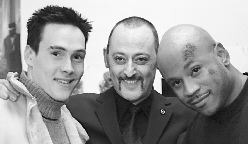Montreal Gazette, October 16, 2000
In defense of Rollerball
All-star cast insists remake of '70s film is a
denunciation of violence
BRENDAN KELLY
The Gazette
 MARIE-FRANCE
COALLIER, GAZETTE / The stars of Rollerball, on the set in Blainville,
can't deny that the remake of the '70s movie about a futuristic
do-or-die game has plenty of bloody thrills and spills, but stars Chris
Klein, Jean Reno and LL Cool J say it does not condone violence. MARIE-FRANCE
COALLIER, GAZETTE / The stars of Rollerball, on the set in Blainville,
can't deny that the remake of the '70s movie about a futuristic
do-or-die game has plenty of bloody thrills and spills, but stars Chris
Klein, Jean Reno and LL Cool J say it does not condone violence.
|
Actors Chris Klein, Jean Reno and LL Cool J
couldn't be more different. Klein, 21, is part of the new wave of handsome young
actors taking Hollywood by storm, Reno is one of the few French actors this side
of Gerard Depardieu to break into big-league English cinema, and LL Cool J is a
hip-hop legend making the transition to big-screen action hero.
But they agree on at least one thing - they
insist the pricey remake of the Rollerball they're currently shooting near
Montreal is not a celebration of gratuitous violence. Sure the flick has plenty
of bloody thrills and spills, but that's because the fictional game of
Rollerball is ultra-violent.
The Rollerball stars take great pains to argue
that the Metro-Goldwyn-Mayer film does not condone gory brutality. Violent
Hollywood flicks are under fire these days from Washington politicians, which is
perhaps why these actors are so quick to suggest the new Rollerball is not an
advertisement for mindless violence.
On a recent snowy afternoon, this unlikely trio
of thespians were squashed into a very small room at the production offices of
Rollerball to talk to a couple of reporters about the new version of the 1975
Norman Jewison-directed cult classic. The offices are located in a bland mall on
the main drag in Blainville, not far from the abandoned cement factory where
much of the shooting is taking place. The film-makers chose this burg, just
north of Laval, because they needed lots of space to build a full-scale track
and arena-style setting to shoot the Rollerball games. Klein, LL Cool J and
co-star Rebecca Romijn-Stamos portray star players in this macabre sport which
involves racing past opponents on in-line skates, motorcycles and all-terrain
vehicles and scoring points with a fast-moving 7-pound metal ball.
Rollerball, the sport, is extremely violent,
with the rules allowing players to routinely beat each other up and -
occasionally - commit murder right there on the track. The actors concede that
there is indeed some fairly brutal action front-and-centre in Rollerball, just
the sort of fare that crusading Arizona Senator John McCain and many of his
colleagues in Washington have spent the past weeks denouncing. Both U.S.
presidential hopefuls and a number of influential senators have recently
condemned the Hollywood studios for selling violent fare to young audiences. But
the stars of Rollerball are quick to argue that their film does not promote
violence.
"It's quite violent, but it is a
denunciation of violence," says Reno, who plays nasty team owner Petrovich
in Rollerball.
Some of Reno's best-known roles are in films
literally exploding with ruthless, heavily armed action, notably Ronin and The
Professional. When pressed, he insists it's not his job to deliver a political
message for or against violence.
"I'm just an actor," Reno says.
"I'm wary of actors who think they're spokesmen. It's the director who
should be defending the films. It's pretentious for an actor to believe he is
responsible for the film's message."
The film-makers are always blamed for making
violent entertainment, but what about the audiences who demand this violence,
Klein says.
"The question regarding movies containing
violence is: who's at fault? The providers or the demanders?" asks Klein,
whose young career already includes leading roles in teen satire Election,
coming-of-age hit American Pie and the upcoming Farrelly brothers comedy, Say It
Isn't So. "This movie is not saying violence is good and it's not saying
violence is bad. It contains violence within a story. The movie's not about the
violence."
It also isn't particularly political, the
actors say. That's in sharp contrast to the first Rollerball. Canadian
film-maker Jewison is known for flavouring his flicks with strong, liberal
political points and Rollerball is no exception. In the original, James Caan
plays a Rollerball champion who wages a one-man campaign to expose the treachery
of the business elite that runs this futuristic world. It serves as a parable
about sports violence as titillating entertainment, a theme more timely than
ever with the furor over violence in hockey following the recent trial for
assault of National Hockey League veteran Marty McSorley. Jewison's Rollerball
also hits a strangely contemporary note with its attacks on the increasing
corporatization of sports, another trend even more prevalent
Back to The
World of Jean Reno
 MARIE-FRANCE
COALLIER, GAZETTE / The stars of Rollerball, on the set in Blainville,
can't deny that the remake of the '70s movie about a futuristic
do-or-die game has plenty of bloody thrills and spills, but stars Chris
Klein, Jean Reno and LL Cool J say it does not condone violence.
MARIE-FRANCE
COALLIER, GAZETTE / The stars of Rollerball, on the set in Blainville,
can't deny that the remake of the '70s movie about a futuristic
do-or-die game has plenty of bloody thrills and spills, but stars Chris
Klein, Jean Reno and LL Cool J say it does not condone violence.